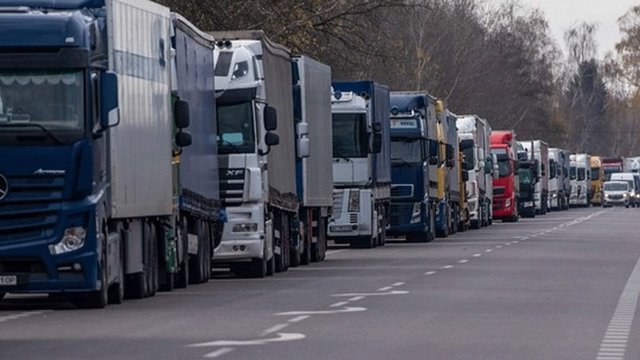Blockade of Polish border leads to increase in retail prices for imported categories of goods

The blockade of the Polish border has significantly complicated the delivery of imported products from Europe, the priority of retail chains for Ukrainian products has reduced risks for consumers, but, the risk of rising prices for a number of categories of goods increases, follows from a survey of retailers conducted by Interfax-Ukraine.
"KOLO prioritizes Ukrainian production and Ukrainian products, which are a key part of our work strategy. However, it is important to understand that some products, such as cocoa, coffee, oranges, salt, are mainly imported. Today, the assessment of our risks is UAH 25-30 million per month, in particular, in the categories of confectionery, alcohol, cheeses, citrus fruits," Director General of the KOLO chain Maryna Serhienko told Interfax-Ukraine.
She said that the chain is now building up small stocks in warehouses for the Christmas and New Year period, and the blocking of the Polish-Ukrainian border has a negative impact on business processes.
"This may lead to a shortage of some goods on the shelves. It is important to understand that this may also affect Ukrainian-made products due to the lack of components for their manufacture or packaging materials," she added.
The ATB press service reported that in addition to Polish goods, goods from the Baltic countries, Germany, Holland, and Belgium are delivered through blocked crossing points, the share of which in the ATB Market assortment is quite significant. In particular, there is a high share of Polish manufacturers in the range of categories of dairy products, frozen vegetables and fruits, pasta, drinks and alcoholic products, detergents and cosmetics.
The Epicenter press service reported that they work through Polish ports, in particular Gdansk and Gdynia, the border blocking affected the number of goods that can be imported into Ukraine, but the share of its own imports in the network is low.
"The team has been working for many years to reduce import dependence: we switched to Ukrainian manufacturers, prefer national suppliers and develop our own production. Therefore, all these measures eliminate problems with the Polish border," the press service reported.
KOLO said that the use of other checkpoints does not solve the problem, since a significant accumulation of transport at these points leads to additional financial costs and a slowdown in border crossing.
"For example, crossing the Ukrainian-Romanian border can increase the delivery time by two to three days, leading to an increase in delivery costs of EUR 600-1,000 per trip. In such conditions, even if transporting goods across other borders becomes possible, problems with temperature conditions during transportation may remain critical for food products, which can lead to further losses and deterioration of the market situation," Serhienko said.
Eco-Market Deputy General Director for Logistics Natalia Krasnikova told Interfax-Ukraine that in some distributors' warehouses in Ukraine there is a decrease in balances, this is directly affected by the fact that due to boycotts of border crossing points, orders for delivery from Europe are about half completed.
"In such a situation, we notice the reluctance of carriers to generally take new orders (cargo on board a vehicle) during a strike, because they may be subject to penalties from buyers due to the inability to fulfill the obligation," she said.
According to Krasnikova, in the short term, it is unlikely that these factors will have a strong impact on prices for end buyers. However, if the situation drags on, prices will begin to rise, primarily for imported goods.
"The cost of domestic goods should change minimally (with the exception of those goods where the share of imported components predominates). All this can lead to a redistribution of the market in favor of Ukrainian companies whose production facilities are located in Ukraine, the components of the products are also produced here, and the enterprises themselves have sufficient production level to fill the niches that were previously occupied by imports," Krasnikova said.







